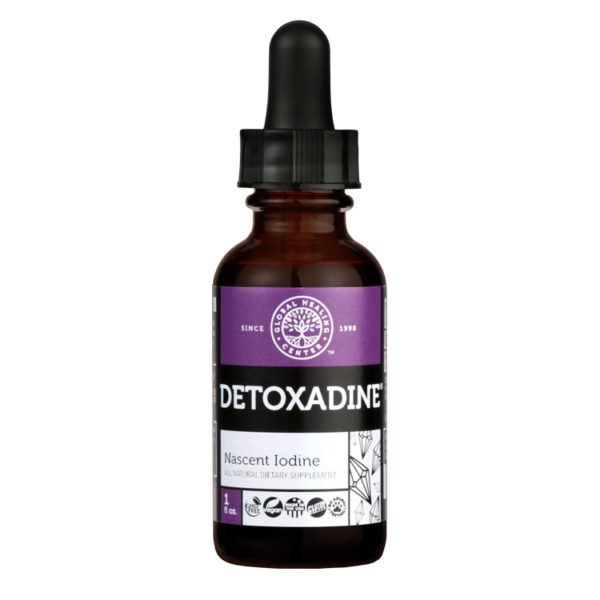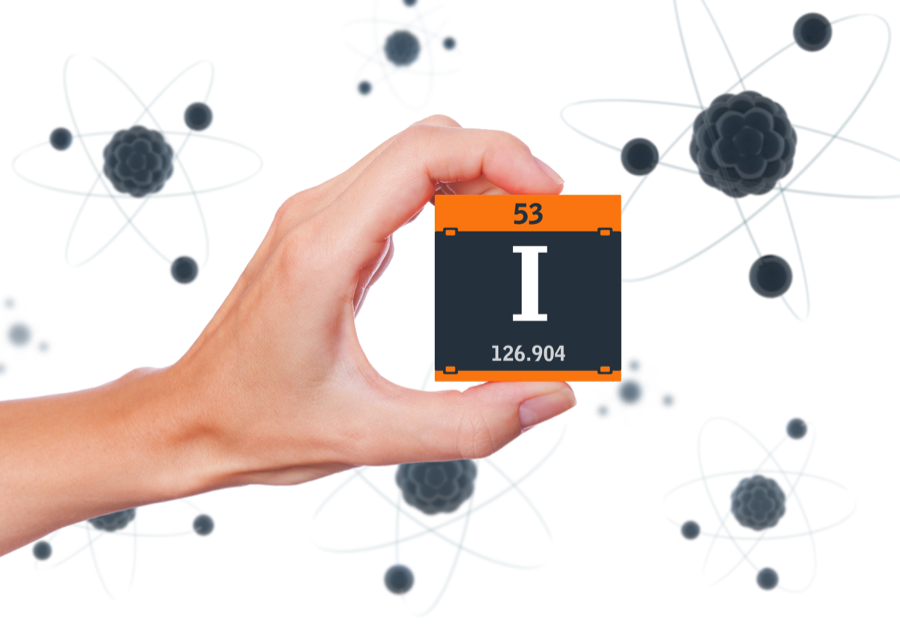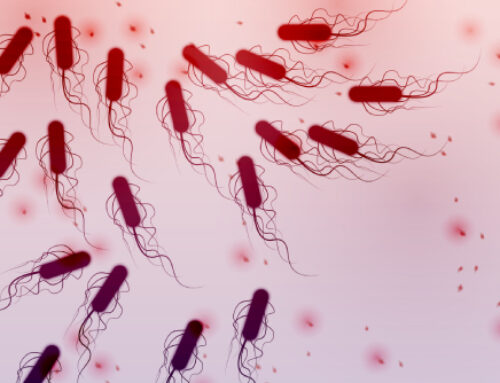Hypothyroidism is a condition in which the thyroid gland does not produce enough key hormones. It is estimated to affect over 20 million Americans, over half of which are completely unaware.[1] Early symptoms can be mild and general, such as depression, weight gain, and elevated cholesterol. Women may specifically experience infertility. More advanced symptoms include goiter (a swelling of the thyroid) and low blood pressure. Men may experience reduced libido as a result of lower testosterone levels.[2]
All of these symptoms result from the hormonal imbalances created by improper thyroid function. The most common cause is iodine deficiency,[3] although genetics[4], certain medications[5], pregnancy[6], exposure to radiation[7], smoking[8], alcohol[9] and stress[10] have also been associated with the condition and/or its symptoms.[11, 12] While many causes have been identified, again, the most common reason is simply not getting enough iodine.
How Does Iodine Deficiency Causes Hypothyroidism?
In the thyroid gland, iodine and an amino acid combine to form two hormones – triiodothyronine and thyroxine. These two hormones regulate metabolic function and the function of other non-thyroid hormones.[13] Without enough iodine in the diet, the thyroid cannot create enough of these two hormones. In adults, this results in problems associated with improper metabolism. During pregnancy, inadequate iodine can lead to impaired fetal development[14] or mental retardation[15].
The Association Between Hypothyroidism and Pregnancy
You may have heard pregnant women say they’re, “eating for two.” Not only do pregnant women need to nourish both themselves and their developing baby with enough calories, but also with enough nutrients. Iodine requirements increase during pregnancy and women must maintain appropriate levels for their own well-being as well as their developing child.[16] Women who suffer from mild iodine deficiency can experience greater deficiency during pregnancy…and they must be aware of this and the potential danger to the fetus.[17] Simply put, women already suffering from hypothyroidism must increase their iodine intake to ensure the health of the child.[18]
While iodine deficiency and hypothyroidism are proven to have substantial impacts on a pregnant woman and her fetus, researchers have identified additional complications related to these conditions…
Complications Associated with Hypothyroidism and Iodine Deficiency
Researchers have recently determined wider-reaching impacts of hypothyroidism. Hearing problems and hearing loss have been frequently reported with cases of hypothyroidism.[19, 20] When children suffer from this condition, it can have long-lasting impacts on education and personal relations.
A connective tissue disease, systemic sclerosis, has also been associated with hypothyroidism.[21, 22] Complications like this show how mineral and nutrient deficiencies can have far-reaching impacts.
Due to the importance of thyroid function to proper hormonal balance and general body function, it is very likely researchers will continue to discover new complications associated with thyroid disorders resulting from iodine deficiency.
Avoiding Iodine Deficiency
There are a number of foods you can add to your diet to increase your dietary iodine intake — and this is perhaps the best method. While it is possible, and many people are able to incorporate iodine-rich foods into their diet, others have lifestyle issues that make it difficult and find it easier to take an iodine supplement. There are a number of options available for iodine supplementation, I recommend nascent, or atomic, iodine as it’s the most bioavailable to the human body.
Has hypothyroidism been a problem for you? How have you dealt with and overcome it? Please leave a comment below and share your experience with us.
If you’re looking for a supplement to boost your iodine levels, check out DETOXADINE at the AlrightStore.

References (24)
- Medline Plus. Hypothyroidism. Last updated: April 23, 2015.
- Maggi M, Buvat J, Corona G, Guay A, Torres LO. Hormonal causes of male sexual dysfunctions and their management (hyperprolactinemia, thyroid disorders, GH disorders, and DHEA). J Sex Med. 2013 Mar;10(3):661-77. doi: 10.1111/j.1743-6109.2012.02735.x. Epub 2012 Apr 23.
- Laurberg P, Nøhr SB, Pedersen KM, Hreidarsson AB, Andersen S, Bülow Pedersen I, Knudsen N, Perrild H, Jørgensen T, Ovesen L. Thyroid disorders in mild iodine deficiency. Thyroid. 2000 Nov;10(11):951-63.
- Genetics Home References. congenital hypothyroidism. Last updated: April 20, 2016.
- Haugen BR. DRUGS THAT SUPPRESS TSH OR CAUSE CENTRAL HYPOTHYROIDISM. Best practice & research Clinical endocrinology & metabolism. 2009;23(6):793-800. doi:10.1016/j.beem.2009.08.003.
- National Institute of Diabetes and Digestive and Kidney Diseases. Pregnancy and Thyroid Disease. Published: April, 2012.
- Jereczek-Fossa, Barbara A et al. Radiotherapy-induced thyroid disorders. Cancer Treatment Reviews, Volume 30 , Issue 4 , 369 – 384
- Brent GA. Environmental Exposures and Autoimmune Thyroid Disease. Thyroid. 2010;20(7):755-761. doi:10.1089/thy.2010.1636.
- Balhara YPS, Deb KS. Impact of alcohol use on thyroid function. Indian Journal of Endocrinology and Metabolism. 2013;17(4):580-587. doi:10.4103/2230-8210.113724.
- Ranabir S, Reetu K. Stress and hormones. Indian Journal of Endocrinology and Metabolism. 2011;15(1):18-22. doi:10.4103/2230-8210.77573.
- Weber G, Rabbiosi S, Zamproni I, Fugazzola L. Genetic defects of hydrogen peroxide generation in the thyroid gland. J Endocrinol Invest. 2013 Apr;36(4):261-6. doi: 10.3275/8847. Epub 2013 Feb 12.
- Laurberg P, Andersen S, Pedersen IB, Knudsen N, Carlé A. Prevention of autoimmune hypothyroidism by modifying iodine intake and the use of tobacco and alcohol is manoeuvring between Scylla and Charybdis. Hormones (Athens). 2013 Jan-Mar;12(1):30-8.
- Ahad F, Ganie SA. Iodine, Iodine metabolism and Iodine deficiency disorders revisited. Indian Journal of Endocrinology and Metabolism. 2010;14(1):13-17.
- F. Vermigllo, V. P. Lo Presti, G. Scaffidi Argentina, M. D. Finocchiaro, D. Gullo, S. Squatrito, F. Trimarchi. Maternal hypothyroxinaemia during the first half of gestation in an iodine deficient area with endemic cretinism and related disorders. Clin Endocrinol (Oxf). 1995 Apr;42(4):409-15.
- Delange F. [Disorders due to iodine deficiency] [Article in French]. Acta Clin Belg. 1990;45(6):394-411.
- National Institute of Health. Iodine. Office of Dietary Supplements. Fact Sheet for Health Professionals.
- Santana Lopes M, Jácome de Castro J, Marcelino M, Oliveira MJ, Carrilho F, Limbert E; Grupo de Estudos da Tiróide. [Iodine and thyroid: what a clinic should know]. [Article in Portuguese] Acta Med Port. 2012 May-Jun;25(3):174-8. Epub 2012 Jul 23.
- Velasco I, Martin J, Gallego M, Gutierrez-Repiso C, Santiago P, Lopez-Siguero JP, Gonzalez Mesa E, Herrera Peral J, Perez V, Garcia-Fuentes E, Soriguer-Escofet F. Maternal-fetal thyroid function at the time of birth and its relation with iodine intake. Thyroid. 2013 Jun 13.
- Gawron W, Pośpiech L, Noczyńska A, Klempous J. [Two cases of hearing loss following Hashimoto disease]. [Article in Polish].
- Wiad Lek
- . 2002;55(7-8):478-82.
- Melse-Boonstra A, Mackenzie I. Iodine deficiency, thyroid function and hearing deficit: a review. Nutr Res Rev. 2013 Jun 12:1-8.
- Vera-Lastra OL, Medina-García G, Guadalupe-Reséndiz-Pérez L, Angeles-Garay U, Torres-Ambriz P, Jara LJ. [Systemic sclerosis and hypothyroidism]. [Article in Spanish]. Gac Med Mex. 2007 Nov-Dec;143(6):471-5.
- Antonelli A, Fallahi P, Ferrari SM, Mancusi C, Giuggioli D, Colaci M, Ferri C. Incidence of thyroid disorders in systemic sclerosis: results from a longitudinal follow-up. J Clin Endocrinol Metab. 2013 Jul;98(7):E1198-202. doi: 10.1210/jc.2012-3583. Epub 2013 Jun 18.
†Results may vary. Information and statements made are for education purposes and are not intended to replace the advice of your doctor. Global Healing Center does not dispense medical advice, prescribe, or diagnose illness. The views and nutritional advice expressed by Global Healing Center are not intended to be a substitute for conventional medical service. If you have a severe medical condition or health concern, see your physician.





Leave A Comment